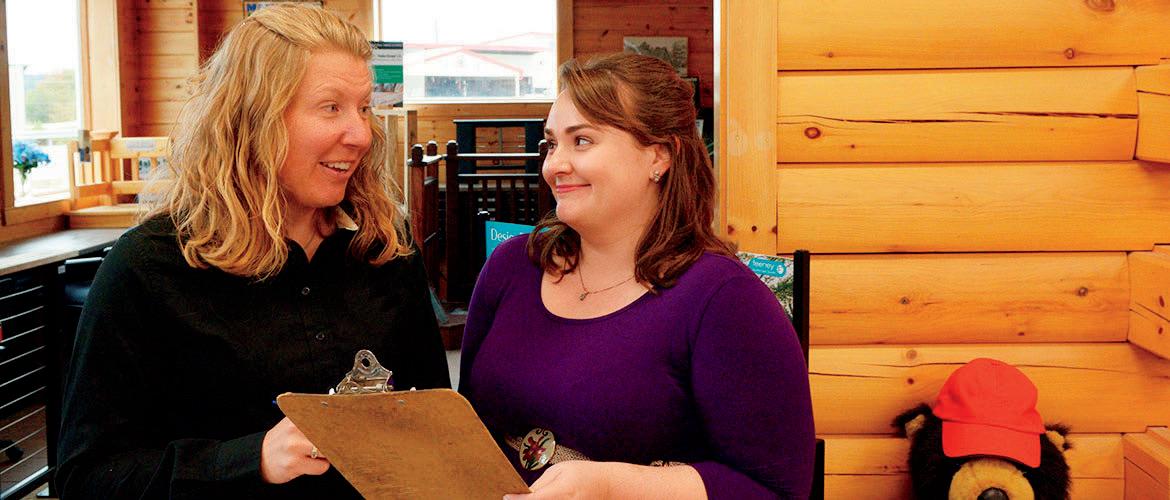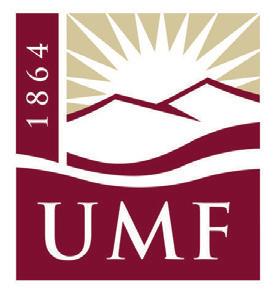








84, NUMBER 4
Maine Educator Cover Contest
22 Winner of this year's cover contest is Samantha Libby

8 Annual Report clearly indicates Maine is behind on pay compared to rest of New England and national data.
Editorial Staff
Managing Editor
Rachelle Bristol
Editor
Samantha Burdick
Layout Design
Shawn Berry
Leadership
President Grace Leavitt
Vice President
Jesse Hargrove
Treasurer
Beth French
NEA Director
Rebecca Cole
Board of Directors
District A: Pamela Kinsey
District B: Kristen Braun
District C: Susan Szava-Kovats
16 Talking about race openly and honestly is essential to creating educational equity for all students and members of the school community. But the approach to the conversation must be handled with care.


7 Celebrate a nation of diverse readers with these recommended books!
MEA Read Across Maine
21 Throughout March, educators from across Maine participated in MEA’s Read Across Maine Challenge.
THANK YOU GRACE
24 Many thanks to MEA President Grace Leavitt
96th MEA Representative Assembly
26 This year RA delegates set the course of work for the union in the upcoming school year, discussed and took positions on key education issues, items voted on by the delegates at the Representative Assembly.
18 MEA caught up with some of our Early Career Educators, each with distinctly different journeys to the classroom, and asked them to reflect on their school year.
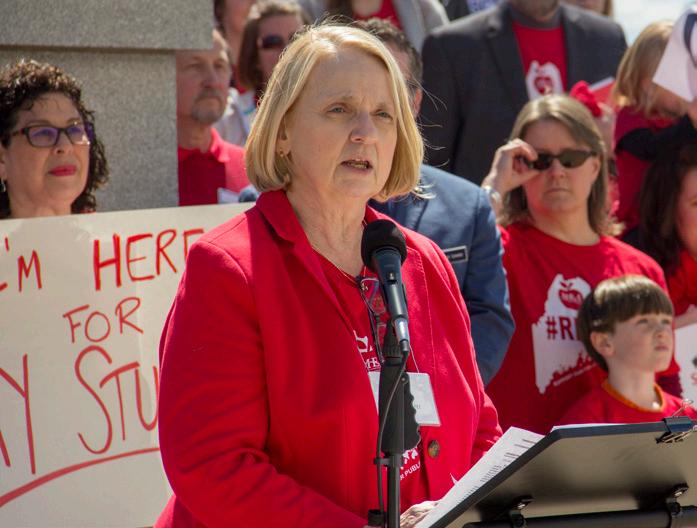
District D: Cedena McAvoy
District E: Thresa Mitchell
District F: Janice Murphy
District G: Valerie Pinkham
District H: Dennis Boyd
District I: Evelyn Atwood
District J: Vacant
District K: Tom Walsh
District L: Rebecca Manchester
District M: Chris Jones
District O: Lisa Leduc
District P: Lisa Henderson
District R: Kay Grindall
District ESP: Jay Nicholson
Student: Zach Wentworth
Maine Educator (ISSN #1069-1235) is published by:
Maine Education Association
35 Community Drive, Augusta, ME 04330-8005 Phone: 207-622-5866 Fax: 207-888-2070
POSTMASTER: send address changes to:
Maine Educator
35 Community Drive, Augusta, Maine 04330-8005
Non-Profit US Postage paid at Augusta, Maine and additional mailing offices.
For advertising rates and information please contact:
Shawn Berry
35 Community Drive, Augusta, ME 04330 207-622-5866
Follow us on social media
Ihave done a lot of driving while serving in this position. Fortunately there is Maine Public Radio (thank you to our members there!). It keeps me up-to-date on issues across our state and the world and the programs provide information on a wide variety of topics. A while ago on Maine Calling I heard an interview with NPR journalist Mary Louise Kelley who talked about her book, “It. Goes. So. Fast.” I ordered it the next day, and it went to the top of the mountain of books that keeps growing in my home. Mary Louise Kelley was spot on.
It. Has. Gone. Sooo. Fast.
I cannot believe six years have passed. I cannot believe this is my last letter in the Maine Educator. I cannot believe I will soon be a member of MEA Retired.
It will sink in eventually, I’m sure, but as I write this, there is still a lot going on—I am not yet ‘done’.
I have been so very fortunate to have experienced so many great things that even having been a “COVID President” can’t obscure them.
Having served on a number of task forces, committees, work groups, and boards, and having attended numerous rallies, galas, forums, councils, and coalition meetings, I have had the opportunity to get to know so many leaders, both in the NEA family as well as in many other organizations and unions. It’s hard to pick even just a few of the moments I know I will remember forever. Certainly having the chance to meet President Biden, to shake his hand and have a conversation with him, is among them. (Also getting a selfie with Patrick Dempsey as he and I waited in the photo line for the President! What a bonus!) Greeting Dr. Jill on her visit to Maine—that was
cool! Giving the commencement speech at the University of Maine at Augusta-definitely an honor and a highlight. Presenting awards and scholarships to so many amazing educators, community members, and students at our annual MEA Awards Banquets--a true privilege. Chairing our Representative Assemblies and hearing your passionate debates—so invigorating. Visiting schools and reading to classes of such great students—always a boost! (One regret—I so wish I had been able to do much, much more of that!) Hearing from our hardworking local leaders on the monthly ‘virtual office hours’ and seeing our committee chairs and members devoting time and energy to our Association has been inspiring. Processing requests for Partnership for Caring and witnessing the incredible generosity and compassion that colleagues have for one another—beyond heartwarming! Working with dedicated MEA staff and our amazing management team has been tremendous. Seeing the halls of the state house fill with MEA members wearing red and engaging with legislators—one of the best sights ever!
And the absolutely remarkable resilience of educators, dealing with March 2020 and all that ensued, or coping with other challenging events (damage from severe weather for one), and of course the still very recent tragedies of October 25th, 2023—the fortitude, determination, and flexibility that Maine’s educators showed-something I will definitely remember.
There is so much more that I know I will continue to reflect on in the coming years.
But meeting and getting to know so many of YOU has by far been the best! (The other regret—I wish I had been able to meet each and every one of you!)
It has been such a great honor and the
highest of privileges to have served as your President. I have learned so much more than I ever could have imagined, from all of you, from our MEA managers and staff, from my NEA colleagues. I will do my best to put what I have gained to good use in a new role as a member of my school board and as an engaged member of MEA Retired.
I’m retiring, but I’m not retreating. There is still much more to do to ensure our Association remains strong to support educators so that our system of public education continues to provide a quality education for every student.
In my first letter in the Maine Educator I introduced myself to you with some numbers. So I will end my last letter with just a few other numbers.
25=the number of years I have been on the MEA Board of Directors—as District J Director, NEA Director, Vice President, and President
1=the number of entries in the journal I vowed to keep during my presidency (things got a little busy…)
Nearly 24,000=the number of members I’ve communicated with via frequent email messages
4,763,598,902=the number of emails you have received from me—I checked! (OK, not really…)
And lastly, 5=the 5th of November, 2024—coming right at us! Just one last reminder from me—I can’t resist!--to be involved in electing candidates who support educators, our students, and public education!



Grace Leavitt MEA President
207-622-5866 x2200
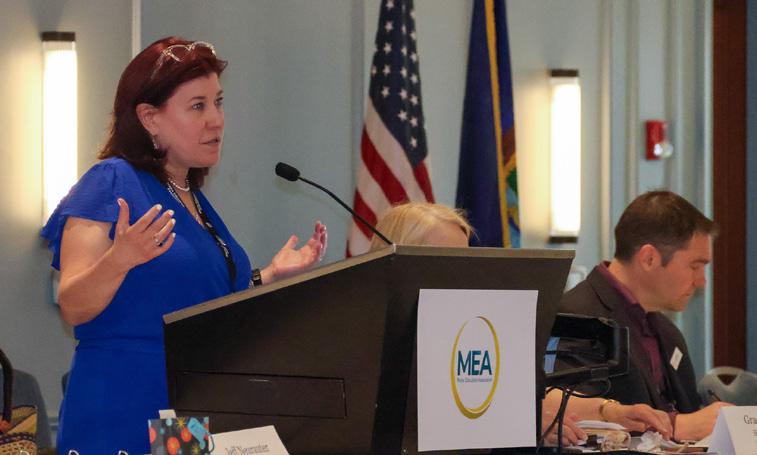
Another year has passed since the last MEA RA, and a lot has happened at MEA, as well as in Maine. In April, Maine found itself in the path of a complete solar eclipse which has not occurred for over 60 years. To celebrate that milestone and the "Educate" theme of our RA this year, I would be remiss if I did not offer a fun fact about solar eclipses. In addition to the temperature drop that occurs as totality approaches, did you know that in Italy, it is believed that flowers planted during an eclipse are brighter and more colorful?
As for MEA, there are many milestones that we have achieved together this year due to the empowerment of our members, another part of our RA theme this year. The word “Empower” has embedded in it the idea of power. Power can mean multiple things and must be harnessed to make change. There are four basic ideas of power in our organizing world – power over, power to, power within, and power with. The most important one is the shared power that grows out of collaboration and relationships and is the foundation of the Union movement. Collective action yields collective rewards. We join a union to align ourselves with others who think like us and want to make the same change. MEA has leveraged its shared power with its members, staff, and leaders to meet many benchmarks and strengthen the association.
What did MEA use its collective power to do this year? How did we move our strategic foci forward?
As many of you know, the MEA Board of Directors has adopted three strategic foci for the last three years. The Board continues to focus on the solidifying
the foundation pieces of our union –membership; diversity, equity, inclusion & justice (DEIJ), and local capacity/member engagement. To measure how the union is doing in each area, the board has adopted metrics that have evolved over time. While I cannot share all the metrics in this article, I will highlight a few key benchmarks.
• The number of locals who engaged in new hire events has doubled over the last two years. This is huge. Getting in front of new hires who likely know nothing about the Union or what we do is incredibly important. It is an opportunity for visibility and connection. This has directly impacted our membership growth over the last year.
• The number of locals that has grown by at least one member continues to grow each year. It is now at 48%. Two years ago, it was at 33%. Maintaining and growing membership is essential to the long-term viability of the union and builds power and influence to effectuate change at the local and state levels.
• MEA membership is up this year in all categories. After sustaining some losses in recent years, we have rebounded nicely. We still need to keep our eye on the prize as we have not regained the numbers we had over 10 years ago and must grow our percentage of members in the early years for long-term sustainability. Early enrollment (free membership in April for the following year) has been successful and has helped to offset the cancellations we have seen in the last six years.
• MEA recently completed an equity audit which turned the lens inward to assess how the association is doing in this area. We engaged Ascension Worldwide to complete the equity audit and provide a report with findings and recommendations. The audit involved document production; member and staff surveys; focus groups; and individual conversations. The results were shared with the MEA Board, MEA staff and MEA members
through webinars and meetings. The Board will be discussing next steps this summer.
• The MEA Board established and funded a designated DEIJ account which has been and will be used to fund our work in this area.
• All MEA conferences have included multiple sessions centered around DEIJ concepts and topics.
• Approximately 90 locals participated in president/treasurer trainings this past year which equals 38%. We need to increase this number. These trainings help locals get the support they need from MEA and serve as a great networking opportunity for local officers to build community and support one another. The MEA Board adopted a compliance policy last summer that outlines the key requirements that all local should meet, and more information will be forthcoming.
• Through a NEA grant, we are working with a local association to build effective labor-management collaboration skills to build power and relationships to help working and learning conditions. We hope to expand this concept to other locals next year.
• The number of participants in both the summer and winter conference has increased with more firsttime attendees than ever with larger numbers of less experienced educators participating.
Overall, we are excelling in moving the work of the Association forward and meeting or improving in a number of the benchmarks the board has set for the organization. It takes all of us working together, again power with to make significant progress in educating, empowering and excelling in our union values and our collective change.


Enjoy your summer and recharge.
All the best, Rachelle

Rachelle Bristol Executive Director


Certification and Professional Growth
Behavior Management and Student Engagement
Technology and Innovation
Diversity, Equity, and Inclusion
Health and Well-Being
Special Programs and Initiatives


This year, MEA staff have trained over 600 members on the Dangerous Behavior Prevention and Intervention law. This law emphasizes creating individualized support plans to equip educators and students with strategies to deescalate and prevent incidents. We've heard our members want more training on behavioral interventions, so our upcoming MEA Summer Camp will include sessions on behavior management strategies, restorative practices, behavior root cause analysis, and student engagement. We encourage you to register!
In the meantime, check out NEA’s Classroom Management MicroCredentials. Each Micro-Credential is worth 15 contact hours and can be completed at your own pace. You'll receive feedback from a real person, allowing you to resubmit assignments if needed. You also have access to all assignments and tasks before committing to a course, and you can take as many courses as you like.
Should you need assistance, just reach out!
REMINDER!
Education Technicians need 45 hours to recertify, while teachers need 90 hours. To check your certification status, log in to your MEIS account on the DOE’s website
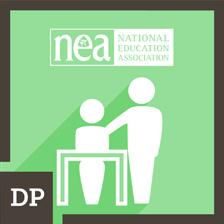

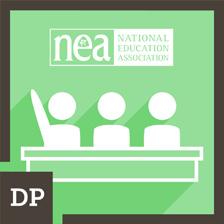

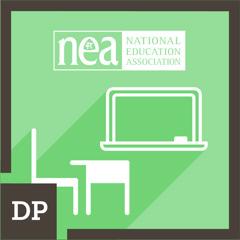
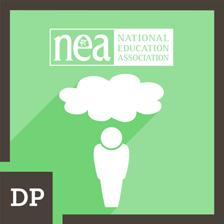






Mallory Cook Director of Training & Early Educator Engagement mcook@maineea.org

BY: MAMTA NAINY
A young boy expresses his moods, showing his individuality and navigating his emotions through the different colors he paints his nails.
THEMES: COURAGE, FAMILY, IDENTITY

BY: LEAH JOHNSON
Twelve-year-old Ellie’s complacency with living her life in the shadow of others changes after she develops supernatural powers after an earthquake.
THEMES: FRIENDSHIP, IDENTITY, LGBTQ


BY: CAMRYN GARRETT
Mahalia couldn’t afford a big Sweet Sixteen like her best friend, Naomi, so works to throw herself a coming-out party instead.
THEMES: FRIENDSHIP, LGBTQ



Annual Report Clearly Indicates Maine is Behind on Pay Compared to Rest of New England and National Data.

Every year the National Education Association releases the Rankings & Estimates Benchmark report. The comprehensive report provides comparative state data and national averages for a wide array of public K-12 education statistics, including average teacher salaries and per-student expenditures. Despite recent gains, Maine trails the rest of New England and nationally in educator pay, and inflation continues to outpace increases.

n 2019, the Maine Legislature passed a law that raised the minimum starting salary for teachers to $40,000 by 2022. As a result, educators in Maine saw the average starting teacher salary increase by 5.3% this year.
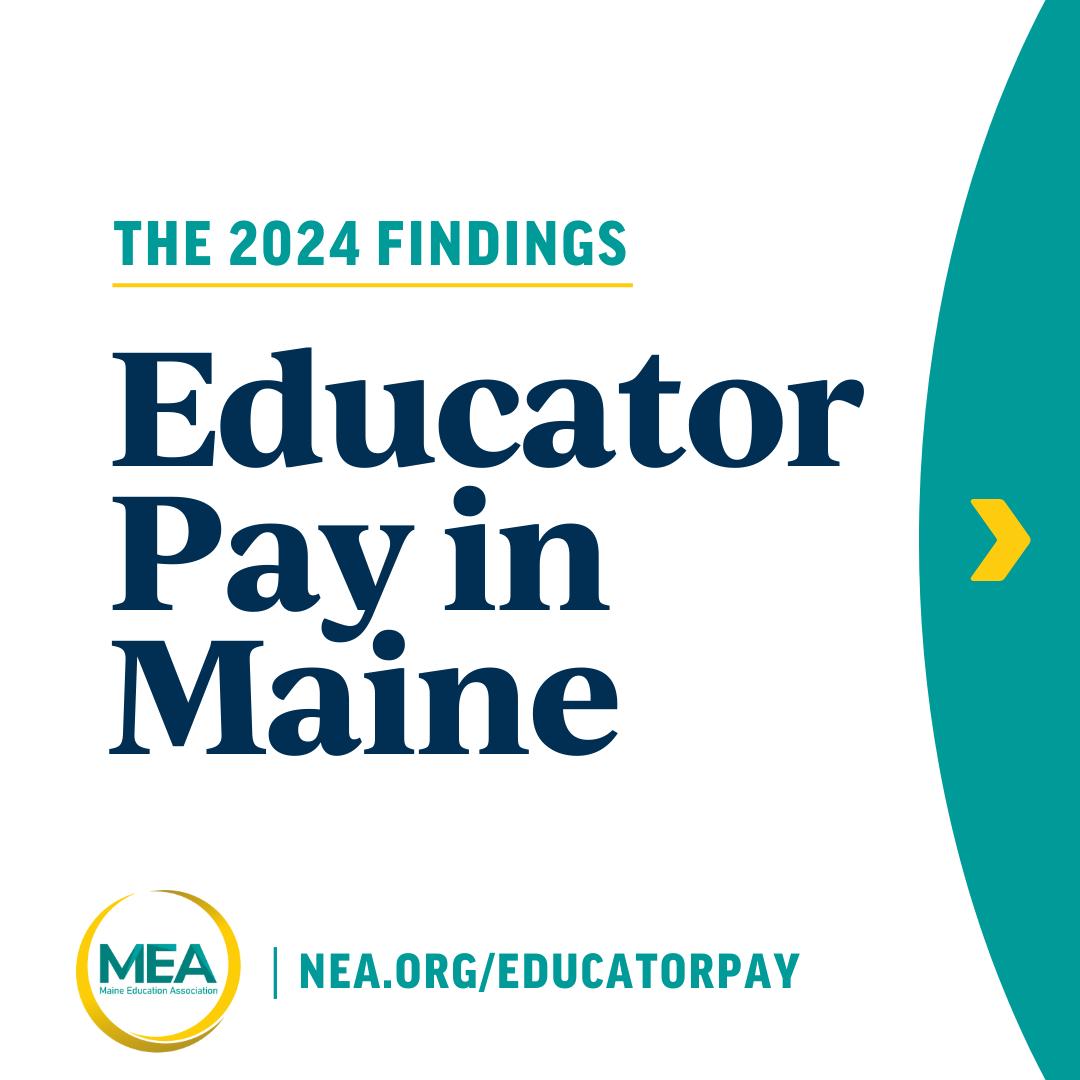
$59,964 (33rd in U.S.)

$41,163 (37th in U.S.)
for
By Mary Ellen Flannery, NEA Senior Writer and Samantha Burdick, MEA. First appeared in NEA
Today April 30, 2024

$39,061 (47th in U.S.)
While Maine's higher education wages increased 5.8 percent from 2022-2023, the cost of food, housing, gas, etc. increased by 6 percent over the same time. Consequently, faculty's purchasing power actually declined by 1.6 percent. This comes on top of a 5 percent decline in purchasing power in the previous year.
Today, it’s almost impossible for younger faculty members to buy homes, says Lisa Botshon, president of the University of Maine Augusta chapter of the NEAaffiliated Associated Faculties of Maine. “Housing costs are high, and not only that, here in Maine, it’s a very closed market for rentals. It’s really a very stressful situation,” she says—and it’s particularly hard on those with small children who also must pay the rising costs of childcare.
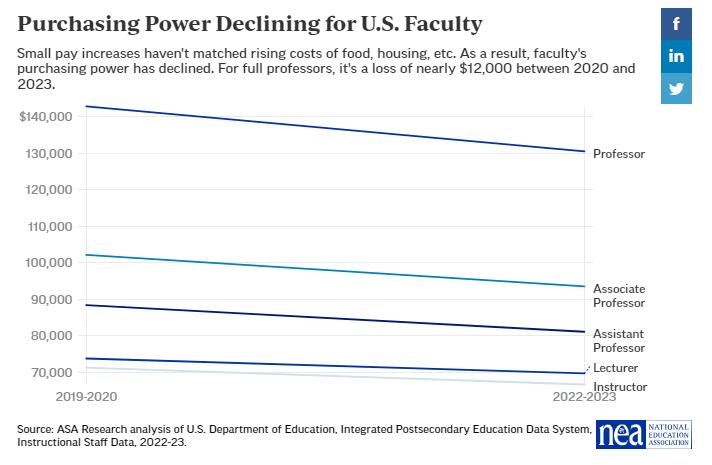
As University of Maine faculty go to the bargaining table this year, Botshon is looking for state legislators to step up. “As in many states, [Maine’s legislature] is contributing significantly less to the university system than it was two decades ago. One of the results is this lack of investment in faculty,” she says.
Lisa
Botshon University of Maine at Augusta

[This work] already requires a tremendous amount of time and creativity, and that's great-if you're supported."
And the results of that lack of investment? It’s harder to hire new faculty, and it’s harder for current faculty to inspire, motivate, engage, and serve students. “[This work] already requires a tremendous amount of time and creativity, and that’s great—if you’re supported,” says Botshon. “If you’re not, and if you’re stressed out about the material conditions in which you’re working, you are not your best self in your classroom. [UM Augusta] is a teaching institution, and we are super dedicated to our students. It’s very frustrating when we can’t be there for students in the way we want to be. It's clearly about public support—are we invested in our students or not?”
The data is clear: faculty who teach at colleges or university with faculty unions are paid more money than non-union faculty, even in the same states.
The Union Difference
Unionized faculty who collectively bargain for better pay are paid much more (nearly $20K at community colleges) than non-union faculty in the same states. Meanwhile, faculty in non-union states are paid the least.
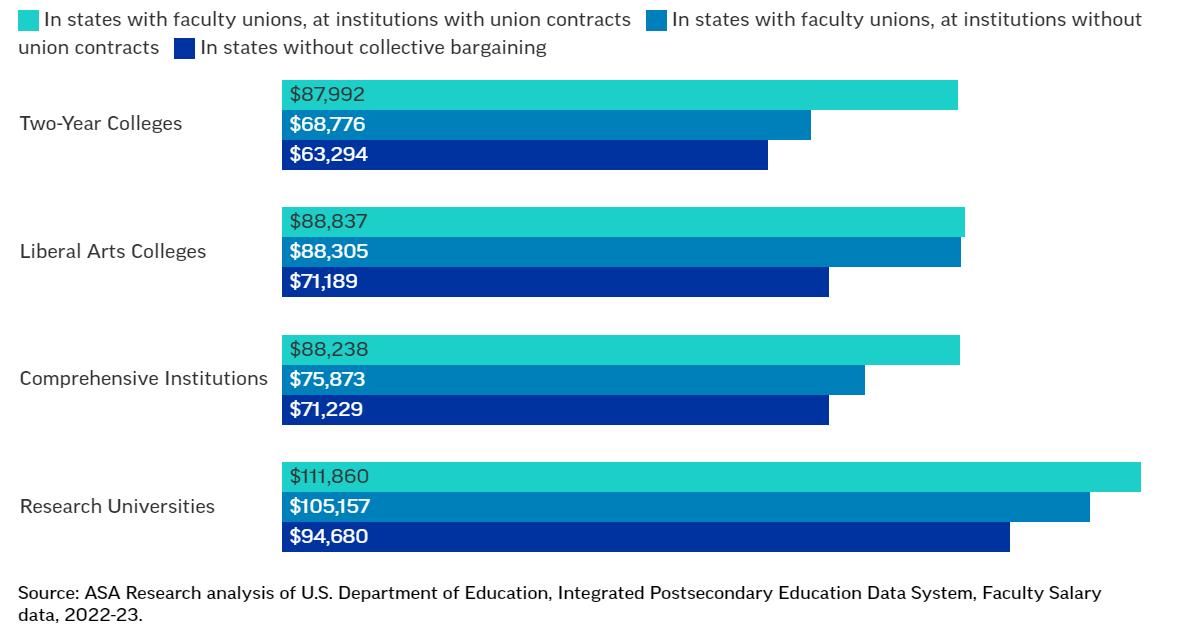
Community college faculty see the largest advantage: at 2-year colleges, faculty who collectively bargain for their pay earned $19,000 more than their colleagues who worked in the same states but without union contracts in 2023, and they earned $25,000 more than 2-year faculty in states without collective bargaining. At research universities, the difference is also significant: union faculty earned $7,000 more, on average, than non-union faculty in the same states, and $17,000 more than their peers in states without collective bargaining.

MEA advocated for measures to increase educator pay, long-term disability insurance for public school employees, and gun safety legislation to make our schools and communities safer.
This year, the Maine Education Association worked hard to create policies and laws to address issues you are dealing with in your work, your schools, and with your students. MEA will continue to advocate in the next legislative session for policies that increase teacher retention and recruitment, retirement benefits, and school funding. In addition to the bills listed below, MEA's presence at the 131st Legislature has:
• Advocated for adding hundreds of millions in additional state funding for local school districts
• Eliminated the testing mandate tied to teacher evaluations
• Ensured that school employees and other public employees were included in the Paid Family Medical Leave legislation
• Advocated for a law which requires administrators to collaborate with local unions when educators face dangerous behaviors at school and established a grievance process to address such issues
• Closely monitored and updated members on proposed certification changes from the Department of Education
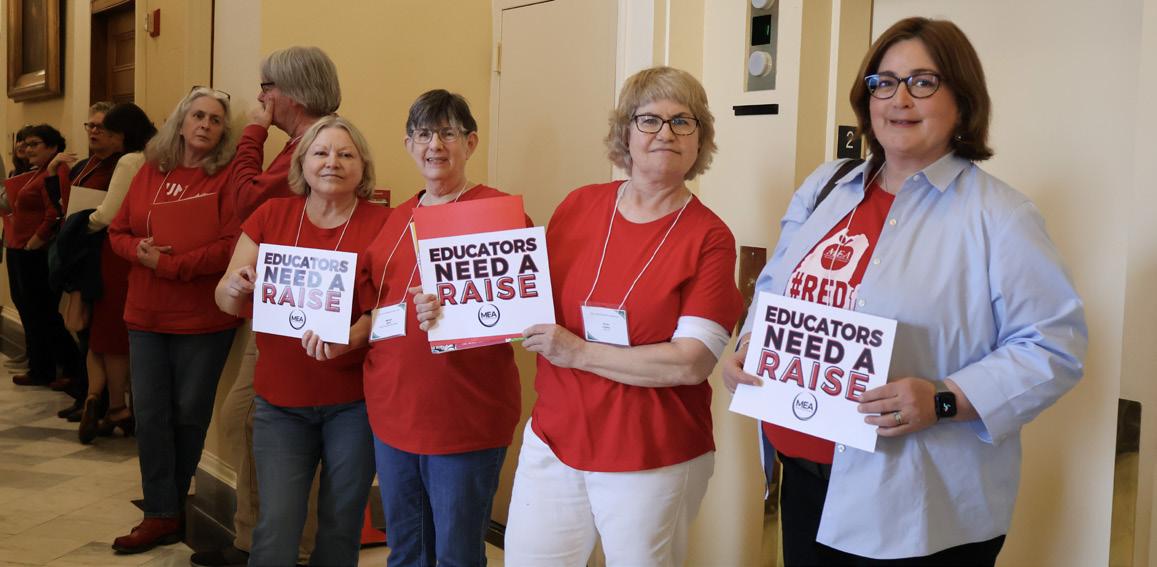
Last year the state provided a 5% increase in the retired teacher health care program, bringing the state subsidy of the Medicare Advantage Plan offered by MEA Benefits Trust to 60% of the premium. In 2024 MEA proposed lifting the state share for retired teacher health care program an additional 5% to 65%.
Status of the Proposal: We achieved strong bipartisan support for additional increases in 2024, but failed to get the funding necessary for enactment.
While we are making forward progress on wages and salaries, we know we need to provide more support for our students and schools. We know we have an even greater need now than ever before, for counselors, social workers, and to help with some of the difficulties our students are experiencing."
Grace Leavitt MEA President

The proposed bill would have raised the minimum wage for all school support staff. MEA’s proposal would have raised the minimum wage for support staff to 125% of the state minimum wage and raised the minimum wage for all ed techs to 150% of the state minimum wage.
Status of the Proposal: The amended version of the bill lowered the minimum wage proposal to 115% of the state minimum wage for support staff and 125% of the state minimum wage for ed techs. This bill passed the House and Senate and was funded in the supplemental budget signed by the Governor.
Over the last few years, MEA has advocated and passed dangerous student behavior legislation to address growing concerns MEA members have about behaviors they see in schools and a lack of action from administrators. This bill strengthened previous dangerous behavior legislation by allowing the Union to file a grievance if the bill is not followed.
Status of the Proposal: This bill was passed by the House and Senate and became law without the Governor’s signature.
This bill created a more streamlined process for public employees in higher education and other public sector jobs to join a union via a card-check process. The card-check process is easier, faster, and avoids delayed union election procedures.
Status of the Proposal: This bill was passed by the House and the Senate and signed into law by the Governor.
In the wake of the Lewiston tragedy last October, the MEA prioritized gun safety legislation with the hope that these measures can keep our communities and our students safe. This year, MEA worked with the Gun Safety Coalition and its more than 60 organizational members to move the following legislative priorities forward.
Proposed by the Governor, this bill partially closed the background check loophole by requiring a background check on all advertised firearms sales. It also amended the state’s “yellow flag” law and included other measures to address gun safety in Maine.
Status of the Proposal: This bill was passed by both the House and the Senate and signed into law by the Governor.
Passed by slim margins in both houses, this bill established a 72-hour waiting period for the purchase of a firearm and the transfer from a seller to a buyer.
Status of the Proposal: This bill passed in both the House and the Senate and became law without the Governor’s signature.
MEA worked on additional bills over the past two years that did not become law. Next year, MEA will continue to collaborate with pro-education allies in the Legislature to make more progress on these critical issues.
We also invite you to visit our Legislative scorecards by scanning the QR code on the next page to see how your representative and senator voted on these measures.
Increasing Minimum Starting Salary for Teachers to $50,000 by 2027
As part of MEA’s ongoing efforts to increase pay for educators, MEA supported a bill that would gradually raise the minimum wage for teachers from the current minimum of $40,000 to $50,000. While Maine made recent progress in raising pay for teachers, the state continues to rank lowest for average starting salary in New England.
Status of the Proposal: This bill was carried over from 2023. It was voted on and approved by the House and Senate but did not receive funding. The final bill was not passed.
Lacking long-term disability insurance, members of MainePERS face financial hardship in the event of extended illness or disability. This bill required MainePERS to provide long-term disability coverage.
Status of the Proposal: This bill was passed by the House and Senate but was vetoed by the Governor.
This session, a bill was presented to ban "bump stocks" and other mechanical or electronic devices that allow semiautomatic guns to operate more like fully automatic firearms or machine guns.
Status of the Proposal: This bill narrowly passed the House and Senate and was vetoed by the Governor. The Legislature attempted to override the veto, but the veto was sustained.
Maine Educators have long faced a pay gap compared to occupations with similar education, qualifications, and experience. For years, wages for educators have risen more slowly than inflation, leaving many of our educators struggling and working multiple jobs to stay afloat. Stagnant wages have plagued retention and recruitment efforts and even caused some educators to leave education earlier than expected to pursue other careers. In fact, the Department of Education announced that they expect shortages in nearly every subject area and grade level.
Kim Hubbard (Tri-County ESP Association) has been an education technician for over two decades. Hubbard and other members from across the state joined a movement of MEA educators who have spent the last year pushing lawmakers to raise educators' wages and help address the staffing shortages in nearly every district in Maine.
"We don't have a shortage of people wanting to be Ed Techs, we have a shortage of people who can afford to be an Ed Tech," Hubbard said in her written testimony to the Education Committee. "A comparison to consider is Walmart starts their student employees higher than the minimum wage. I know this because the kids at school delight in telling me they make more than me!"
MEA's effort to raise wages for support staff resulted in the first ever new minimum for all hourly paid educators in our schools. This landmark bill (LD 1064) paves the way for educators across the state to be compensated better for the invaluable support they provide our students and schools, ensuring the safety of our educational institutions. The final proposal was funded through the supplemental budget and raises wages for all education technicians to 125% of state minimum wage and other hourly support staff to 115% starting in the 2025-2026 school year. If the bill were in effect today, the minimum wage for all ed techs would be $17.69, and the minimum wage for all other hourly support staff would be $16.28.
In the first year of implementation (2025-2026 school year), the state will pay the full costs of the increases. In the future, costs will be reflected in the school funding formula. Additionally, the supplemental budget maintained 55% of state funding for schools for the fourth consecutive year.
“I have personally witnessed our teammates leaving our school at unprecedented rates. Simply put, education support professionals cannot afford to stay working in the jobs they love, building relationships with students.”
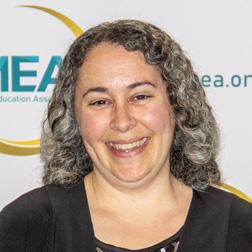
MEA brings together members to screen candidates who support us and advocate for pro-education policies that support our schools, our students, and our professions. Endorsing and electing candidates who support MEA’s goals increases the Union’s ability to pass favorable legislation.
The Screening and Endorsement team is made up entirely of MEA members consisting of MEA Officers, MEA Board of Directors, MEA Government Relations Committee, Local Association Presidents or their designees, and MEA RA delegates.
MEA Members determine MEA policy priorities through member-led proposals and discussions. Screening and Endorsement questionnaires are created based on issues identified by MEA RA delegates, MEA Officers, Board of Directors, and Government Relations Committee members.
The Process: STEP 1:
MEA prides itself on having a clear, fair, and democratic process leading up to the endorsement of a candidate.
1
Following the June Primary, questionnaires on public education issues are sent out to candidates. All questionnaires must be filled out by the candidate and returned to MEA by the deadline to be considered for the Screening and Endorsement process.
STEP 2:
2
3
The Screening and Endorsement team meets in July to evaluate the questionnaires returned to MEA by the deadline. MEA members on the Screening and Endorsement team lead discussions to determine which candidates align with MEA policy priorities and propose candidates for MEA’s collective endorsement.
STEP 3:
The Screening and Endorsement team sends endorsement recommendations for candidates to the MEA Board of Directors who make the final decision on endorsements by the Union.
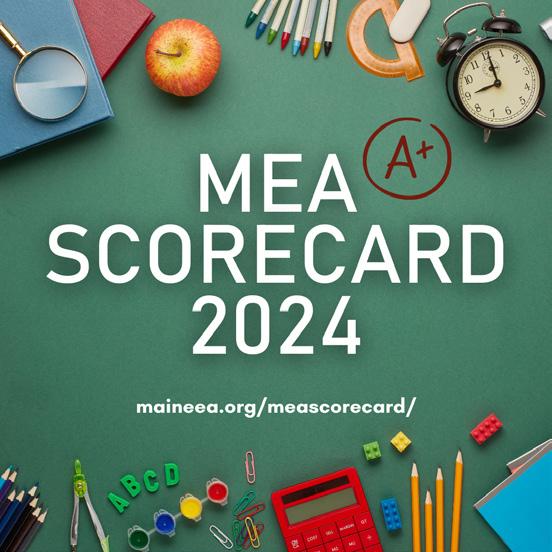
CHECK OUT THE LATEST MEA SCORECARDS
MEA created a searchable database to make it easier for you to find your lawmaker so you can learn how they voted on important education and union issues to help you make an informed decision come election time.
STAY UP TO DATE WITH LOCAL AND STATE ELECTIONS AND BILLS WE SUPPORT IN AUGUSTA SIGN UP FOR OUR UNDER THE DOME EMAILS











Editor’s note:
Educators read diverse books so that they can better understand their colleagues, students, and families they serve. The books here are not recommended for students.
BY: NICO LANG
American Teenager gives readers a window into the lives of Wyatt, Rhydian, Mykah, Clint, Ruby, Augie, Jack, and Kylie, eight teens who, despite what some lawmakers might want us to believe, are truly just kids looking for a brighter future.
BY:MORGAN TALTY
Morgan Talty, is a citizen of the Penobscot Indian Nation and MEA Member. Night of the Living Rez is a riveting debut collection about what it means to be Penobscot in the twenty-first century and what it means to live, to survive, and to persevere after tragedy.


BY: CYNTHIA "CB" ANDERSON
Weaving together the experiences of refugees, longtime residents, and community leaders, the book explores the challenges and triumphs of a city's reinvention. Witness the struggles of a single Muslim mother, the anxieties of an anti-Islamist activist, and the hopes of a young Congolese refugee.

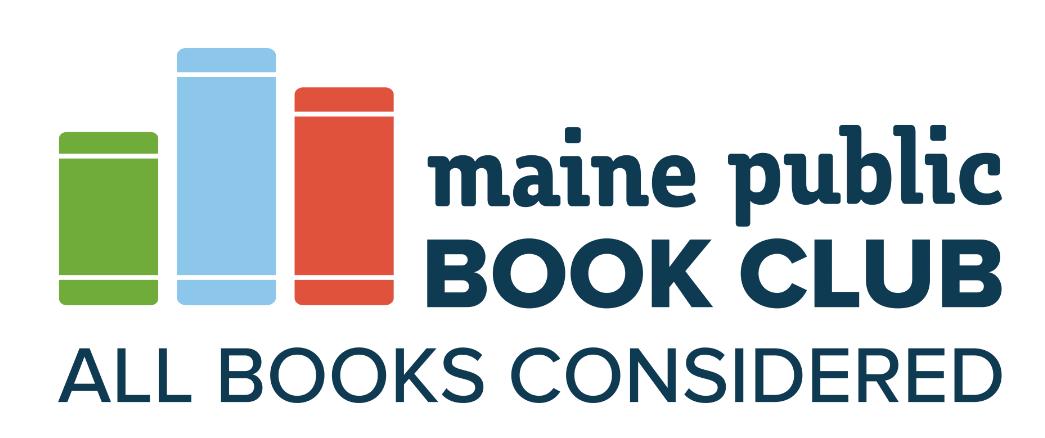

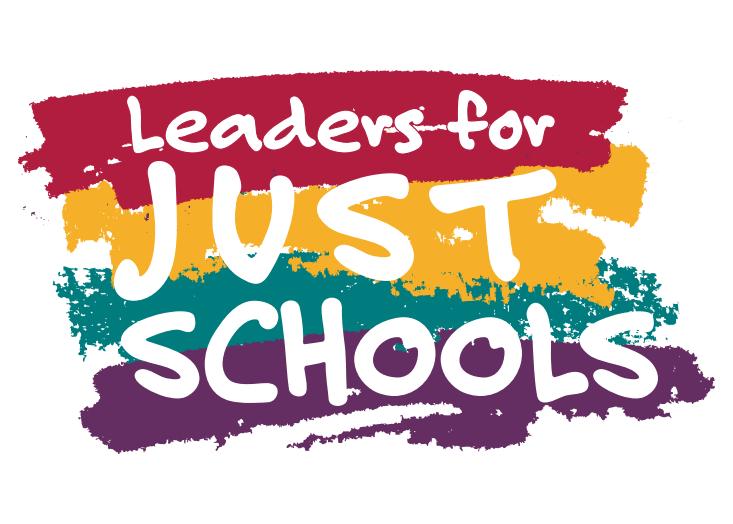
By: Cindy Long, Senior Writer, adapted by Samantha Burdick
Imagine standing up in a staff meeting at school and saying, “Let’s address institutional racism in our schools.” How would your colleagues react? Some might welcome an open discussion, but many would probably shift in their seats and glance around nervously. A few might even get up and walk out of the room.
Talking about race openly and honestly is essential to creating educational equity for all students and members of the school community. But the approach to the conversation must be handled with care.
In 2019, NEA created a program called Leaders for Just Schools (LJS), a national network of educators who are prepared to advance equitable education. LJS helps participants better understand how
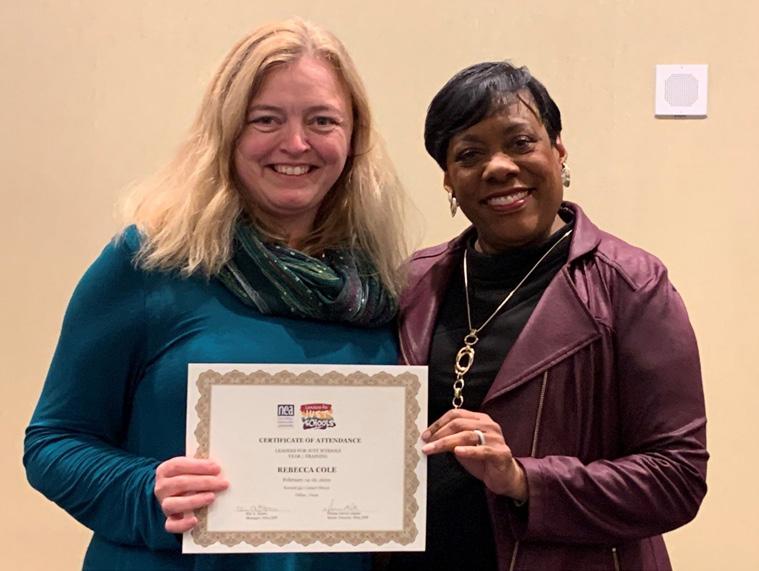
to cultivate equitable, just schools for students of every race, place, background, and ability.
“The Leaders for Just Schools curriculum has been incredibly helpful in facilitating meaningful, impactful reflection and self-awareness among our educators so that they can, in turn, provide equitable environments for all members of our learning communities. The ‘ripple effect’ of this work is visible, essential, and sustainable,” according to NEA Director Rebecca Cole.
LJS focuses on the intersection of racial justice in education and understanding how to use the levers of local, state, and federal policy—specifically the Every Student Succeeds Act (ESSA)—to create equitable learning spaces for all students.
More than 200 educators from across the country are currently engaged in the three-year program. Additionally, nine educators from Maine have either completed the program or are currently engaged in a cohort, and four more educators will join as part of the 2024 cohort this summer. Typically held in summer, the training kicks off with virtual sessions followed by in-person learning experiences.
Leaders for Just Schools allows us to build connections with educators across the country...We are in contact with our cohort throughout the year. We discuss policies and practices that impact our schools and ways we can support our learning communities. I am excited to connect in July at LJS MegaWeek."
Nesrene Griffin
Lewiston EA

“Leaders for Just Schools allows us to build connections with educators across the country,” said 2023 cohort member Nesrene Griffin (Lewiston EA). “We are in contact with our cohort throughout the year. We discuss policies & practices that impact our schools and ways we can support our learning communities. I am excited to connect in July at LJS MegaWeek."
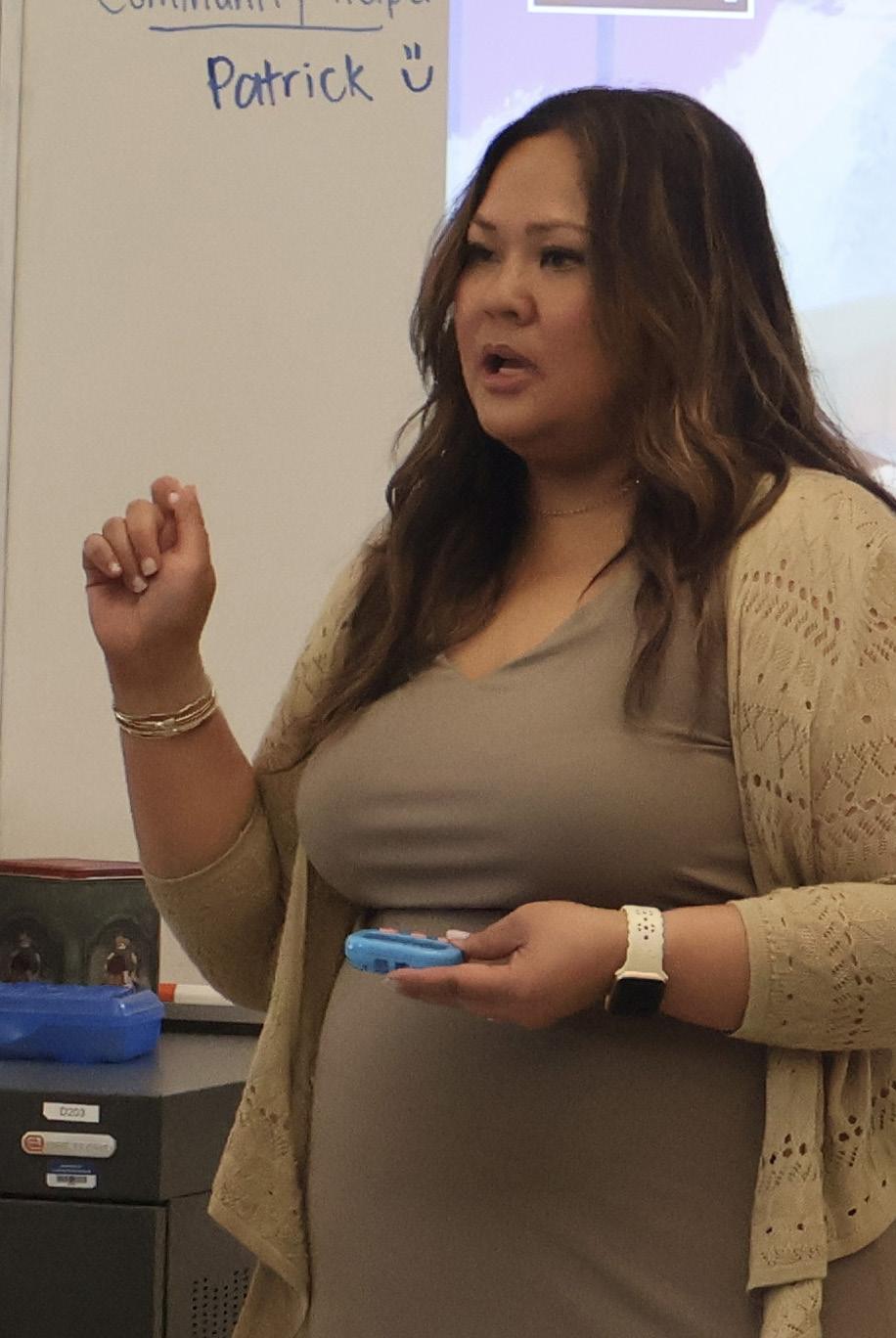
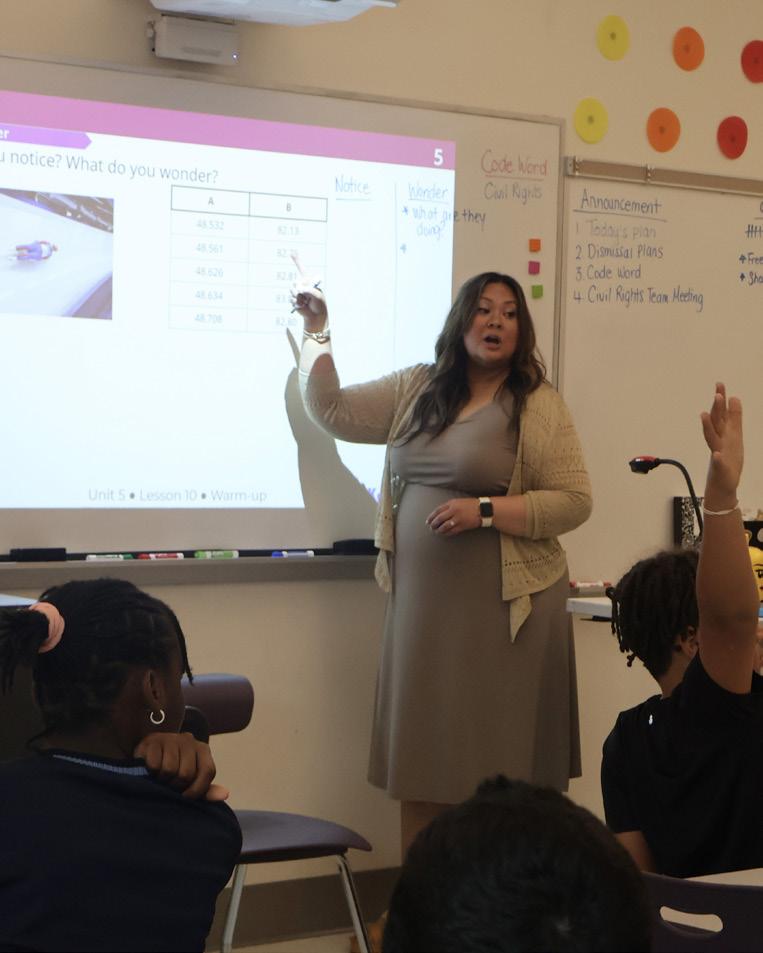
In the first year, educators learn about critical definitions and topics in education justice. And they turn inward to explore their own biases.
In year two, participants examine structural inequities in education and focus on building partnerships with families and communities to break those structures.
In year three, they create a plan to address a “problem of equity” that they have identified in their own schools or communities. Over the course of this learning journey, educators develop the knowledge and skills to advocate and organize for education justice.
So how have LJS participants been doing better?
Educators that participate in the program have the opportunity to create an advocacy plan addressing an issue in their school, district, or state. From implementing new classroom policies to reviewing school handbooks to offering testimony at school board meetings, an array of projects stem from members’ engagement in the program.
The beauty of the LJS program is that the learning is ongoing. After educators complete their three-year learning journey, they continue the work at home, leading the effort to promote just and equitable learning environments in their states, districts, and school communities.








The Leaders for Just Schools (LJS) Program Report outlines all aspects of the program: It provides a complete overview of program structure, major activities, and timeline; resource creation and extended learning opportunities; and clear and undeniable evidence of the work of LJS participants in their own schools, districts, and communities.
Through Leaders for Just Schools, we are building a nationwide network of educators who cultivate equitable, safe, and just learning environments for all students across race, background, ability, and ZIP code. The program prepares educators to take informed action to advocate for their students by leveraging educator voice and input on key decisions around school improvement to ensure equitable outcomes in schools across the country


It seems like everywhere we turn people are talking about the shortage of educators in our schools. MEA caught up with some of our Early Career Educators, each with distinctly different journeys to the classroom, and asked them to reflect on their school year.
Kendrah is a first-year Science teacher at So Do Mo Cha Middle School in Dover Foxcroft. A graduate of the University of Maine, Kendrah was a member of MEA’s Aspiring Educators and served on the MEA Board during her senior year. Kendrah will be joining the Board again this year, representing District C.
What inspired you to become an educator?
I did not know that I wanted to be an educator until I had the chance to begin some of my college classes. As I continued through them, I found that while I enjoyed the content of my courses, what I loved was being a part of learning within them. I also reflected back on teachers that had truly impacted my life. There have been many times this year I have thought of them. My past teachers truly set the bar so high for me, and I have great role models to look up to because of them.
What is one thing that surprised you this year?
One thing that surprised me about my first year of teaching was the sense of community among teachers. I feel extremely lucky to work in a place and state that has my back and lifts me up as an educator. I know there are people that want to see me succeed, but I just did not expect there to be so many of them.
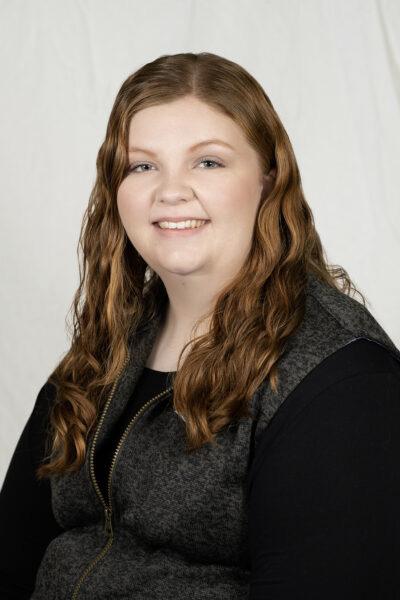
What is one thing that you wish you had known before starting this year?
I wish I knew that before I started the school year is that a lot of teaching is about relationships and understanding the non-academic needs of your students. I’ve heard cliché statements like “teachers wear many hats.” Now I know how true they are. I have found myself mediating disagreements, braiding hair, repairing clothing, providing snacks, being a referee for football and four-square at recess, providing first aid, cheering on students in extracurriculars, and supplying tissues during hard times—just to name a few.
These “hats” were things that I was not
prepared for when I began teaching. College taught me how to plan and execute effective lessons, but nothing prepared me for the many “hats” I would wear as an educator. It was overwhelming at first, but now I am proud that I get to support so many kids in a positive way.
What are you looking forward to next year?
One thing that I am looking forward to next year is gaining confidence as an educator. After being through my first year, I know what to expect in some aspects of teaching, while I know there are others that are still unpredictable. Having experience under my belt helps me to reflect and grow is something that I am thankful for.
How has your union supported you?
MEA has supported me in several ways as a first-year teacher. I have attended several professional development sessions that helped me gain confidence as I took on my first year of teaching; these sessions taught me about my rights and several ways to support students. MEA has also connected me with a community of teachers across that state. If I have questions about academic content or how to handle specific IEP questions, I know someone who could help and provide support! I would not be the educator that I am today without the support of MEA in both my days as an aspiring educator, and my days as a first-year teacher. Thank you, MEA!!!
Lauren’s career in education and teaching multilingual learners started ten years ago and has spanned multiple countries and continents. After teaching English abroad for a number of years, Lauren has returned to New England and teaches K-5 Spanish at Mildred L. Day school in Arundel.
What inspired you to become an educator?
For me, and, presumably, many others in the field, the desire to become an educator was inspired by having a positive learning experience of my own as a child. Spanish class, in particular, completely changed the way my younger eleven-yearold self saw the world outside of the rural, largely monocultural landscape where I grew up in central New Hampshire. The introduction of a new language (and the various ways of using that same language across several different countries that claim it as its national tongue), unfamiliar foods, and boisterous celebrations rooted in Hispanic culture opened up a well that I had to get to the bottom of.
Fast forward twenty or so years, and I’m still searching for the bottom of that well--though I’ve got a sneaking suspicion there is no bottom--and inviting others to join me in my pursuit. So far, the journey has taken me all over the map: working as a volunteer English teacher in Costa Rica while studying abroad, teaching Spanish at Boston College while earning my master’s in Hispanic Studies, serving at bilingual elementary schools while living in Seville, Spain, for six years, and, most recently, nestling into my niche as a K-5 Spanish teacher here in Arundel, Maine.
What is one thing that surprised you this year?
During the second week of school, we unexpectedly welcomed two new students from Ukraine. Not only were they tasked with adjusting to life in a new country and making friends in a new school, but they were also propelled into an entirely new language. While they quickly received English language learning support from our team, some wondered whether or not sending them to Spanish class would put too much on

their plate. I was sensitive to the students’ needs but, ultimately, encouraged their attendance in Spanish. As it turns out, the immersive Spanish environment became a confidence-boosting, even playing field for these students. The language was just as new for them as it was for many of the others in their respective classes, thereby placing success within equal reach for all students--regardless of their native language. This was tremendously gratifying to be a part of, and it further validated my approach to immersive language teaching.
What is one thing that you wish you had known before starting this year?
I wish I had known sooner how at home I’d feel in this new school. The excitement of starting fresh somewhere is often met with a competing amount of nervous anticipation. Knowing how welcoming and supportive the students and staff at Mildred L. Day School would be from day one certainly would have spared me a few of those pesky first-year jitters. :)
What are you looking forward to next year?
I’m looking forward to building upon the strong foundation that’s been set this year. Coming into this year, it was difficult to know where my students would be at— particularly because the Spanish program had been passed through several different sets of hands within a short period of
time. Now, I’ve got a much clearer idea of what my students bring to the table, what challenges they’re capable of rising to, and how we can maximize our time together each week. The students are familiar with our classroom routines, they’re more confident in the immersive space, and, most importantly, they see that it can be a lot of fun, too! Onward and upward!
How has your union supported you?
One thing I can say with absolute certainty is how grateful I am to the MEA for the work they’ve done, alongside KAKEA and the RSU 21 administration, in advocating for full-time world language teaching positions at the elementary level. I can’t tell you how many times I’ve heard someone say, “Really?! That young?!” upon sharing that I teach Spanish to kindergarteners. Yes, really—and not only that but, in fact, it’s one of the most critical times to learn a language. The MEA’s support in this area made this first year possible for me, and it continues to nourish the kind of teaching that I am most passionate about and hope to pursue for years to come.
What is one thing you are going to do to rest and recharge this summer?
I’ll be keeping quite busy this summer working as a guide for an outdoor education organization in Portland and DIY-ing my way down the aisle for my wedding in August. In the occasional quiet moments that I’m able to scoop up this summer, I’ll likely be picnicking at the beach, camping off-grid, or pouring energy into a few creative projects.
Continued on the next page →
After years of being a caregiver, Hilary restarted her career in education at Maranacook Community Middle School, teaching German. Hilary also serves on our Government Relations Committee at MEA and was recently elected to the MEA Board for District F.
What inspired you to become an educator?
I was bullied in junior high – a few things made such a difference in my life. A teacher was one of them, but I didn’t know at the time I would become a teacher. It wasn’t until I was in college, when I had the opportunity to work as assistant teacher for German classes, that I realized I enjoyed it and had some skill for the profession.
What is one thing that surprised you this year?
I started the year with a lot of teaching experience, but this was my first year in a public school. I came into the year with more worries about how things might be different in “public school” than necessary. My biggest surprise –how much I would LOVE it! From the students to the staff – I feel like I’ve found my home at MCMS and never want to

leave! Sure, it was an exhausting year, but this has been one of the most fulfilling teaching positions I’ve ever had.
What are you looking forward to next year?
A lot of this year was about learning the ropes and establishing relationships with students and staff, but it’s all been a blur. I’m looking forward to taking advantage of professional development opportunities and really digging in next year and helping my students to become
How has your union supported you?
I attended the winter conference with a colleague and came back so energized! I learned so much from the contract session, and what I learned has already benefited some of my colleagues and me when some questions came up this year. After the conference, I signed up to serve on an MEA committee to stay involved.
Many people don’t realize that the MEA serves all teachers – not just those who pay dues. (Isn’t that wonderful?!) Many first-year teachers might not know they can even reach out to their Union building representative if they don’t belong to the MEA. I think every first-year teacher should know this.
What is one thing you are going to do to rest and recharge this summer?
I didn’t find a way to balance work and exercise this year. I’m looking forward to getting outside and doing daily exercise again. My hope is to carry that habit over and incorporate it into the work week once school resumes. I prioritized my job this year – and that’s ok because I loved it so much. But next year, I must make time for exercise – it’s important to me. It’s a form of therapy for me and I know it will help ensure I’ll be more present for my students.


“Throughout the month of March, I saw students branching out across multiple genres, themes, and topics and truly exploring their reading on a deeper level. We had more conversations about reading and their comprehension than ever before, and I truly believe that this challenge kickstarted a love of reading for most of my learners."
Ashley Cram 4th Grade Teacher

“Each week students in our class read a book to meet their individual reading goals such as decoding, fluency, and comprehension skills. We are incredibly thankful for the gifts of books and the Little Free Library. It makes a difference for our school.”


Holly Morgan Special Education Teacher
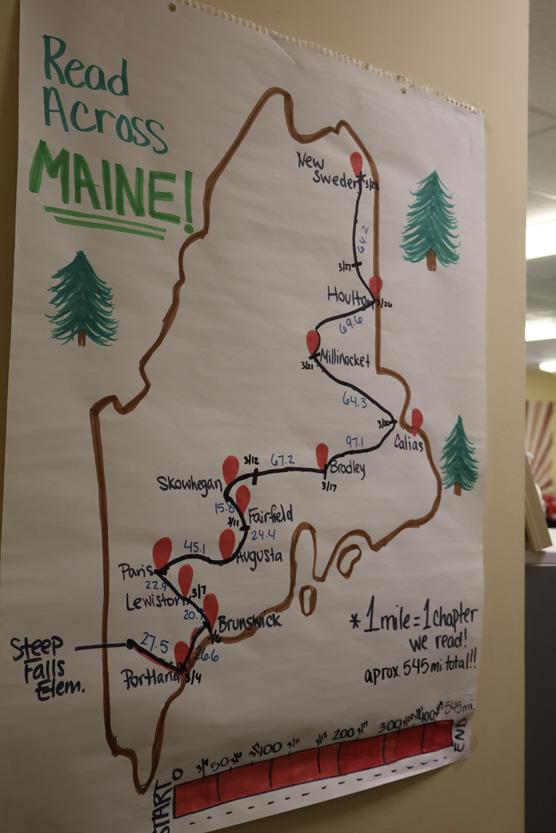


Throughout March, educators from across Maine participated in MEA’s Read Across Maine Challenge. Read Across Maine is part of the National Education Association's Read Across America initiative. Educators set individualized reading goals for their classrooms to encourage students to develop a love for reading, explore diverse books, and improve reading skills by embarking on an exciting reading journey through Maine.
MEA President Grace Leavitt visited the two grand prizewinning classrooms to present them each with a Little Free Library for their schools, to read to their classes, and congratulate each class on their reading growth.
MEA awarded four prizes for the Read Across Maine Contest:
Grand Prize: Ashley Cram from Steep Falls Elementary and Holly Morgan from Palermo Consolidated School. Both classrooms displayed significant growth with their reading goal and won a Little Free Library for each of their schools, $1,000 to purchase books for their classroom libraries, and a book for every student in the class.
Second Place: Kim Nielsen's third-grade class at Crooked River Elementary earned second place and won $500 for their classroom library.
Third Place: Nick Fuller's fourth-grade class at CK Burns School won third place, earning each student a book to bring home for the summer.
The MEA is pleased to showcase student artwork during its eighth annual Maine Educator Art Cover Contest. MEA believes in celebrating the successes of our students and members, and this cover contest gives the Union that opportunity.
Congratulations to all the students and teachers!




Digital Art Category
Tyler Martin Brunswick

Drawing Category
Curran Villone AOS 94
Teacher: Sue Griffith

K-3 Category
Silas Pothier AOS 93
Teacher: Angela Nilles

Landscape Category
Mia Kincaid & Ily Darling
Five Towns
Teacher: Miki Glasser

Maine Symbols Category
Lydia Bailey
Hermon Middle School
Teacher: Karen Hendrix
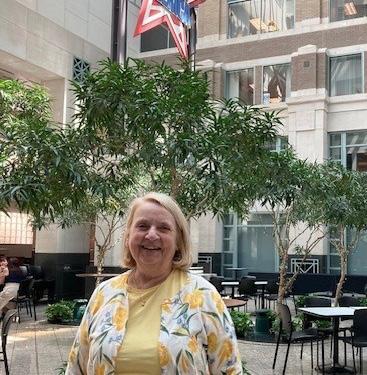


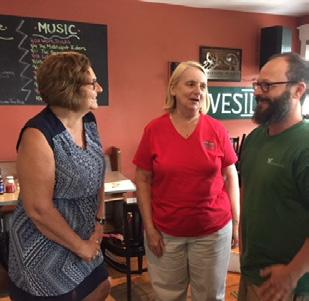

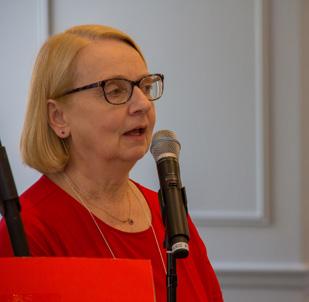
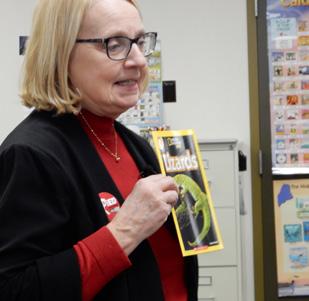


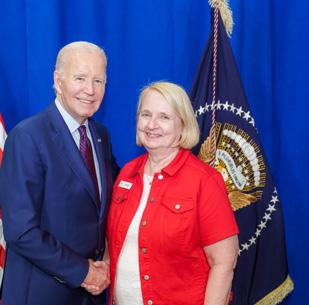
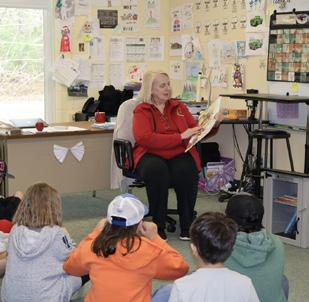


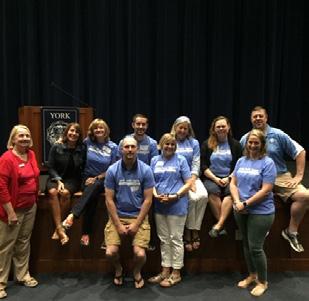
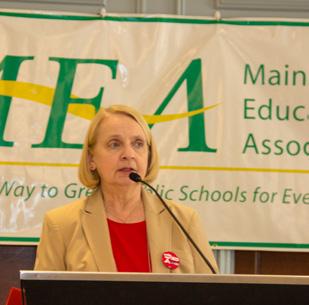

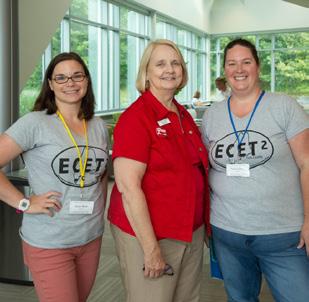
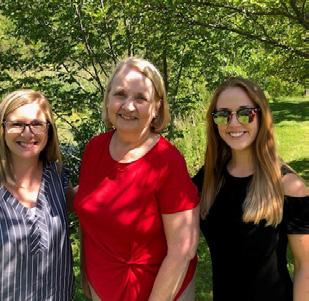

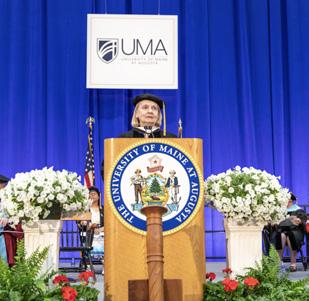



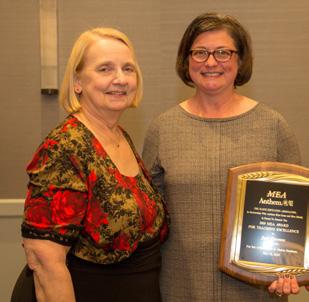



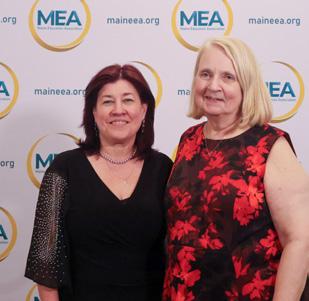
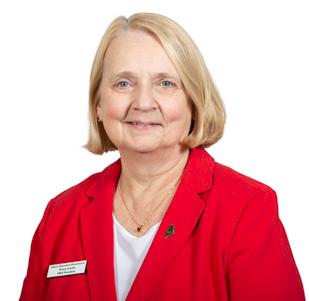
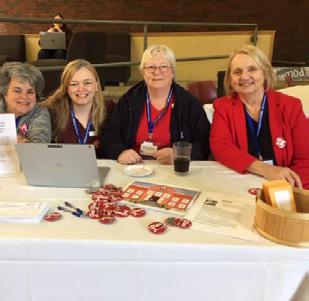
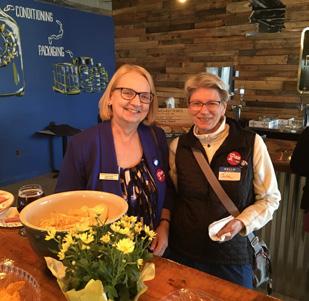
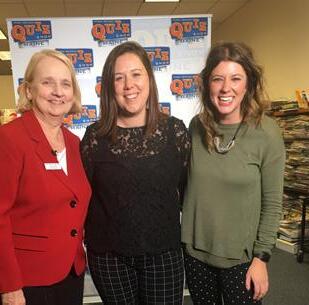



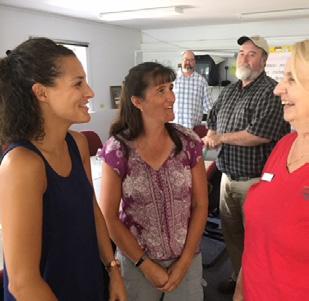

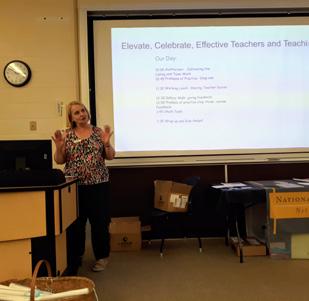


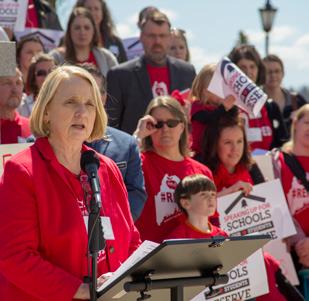


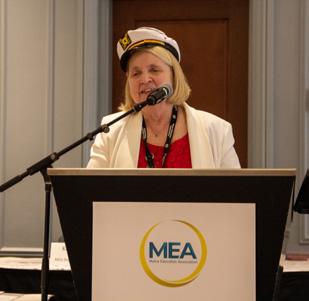



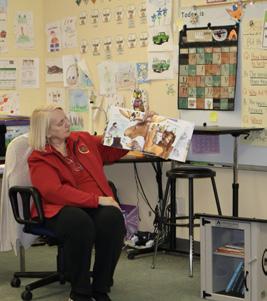



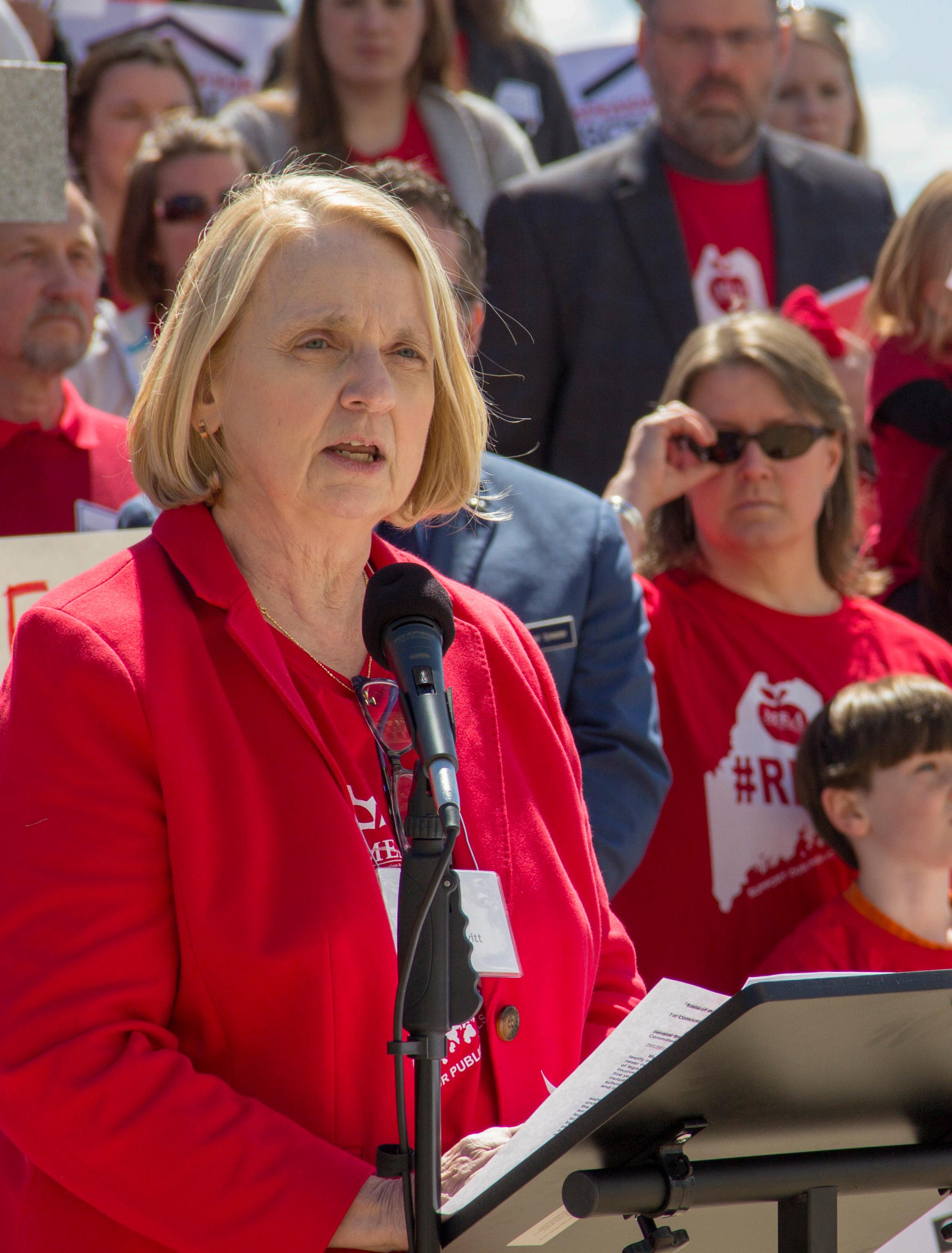
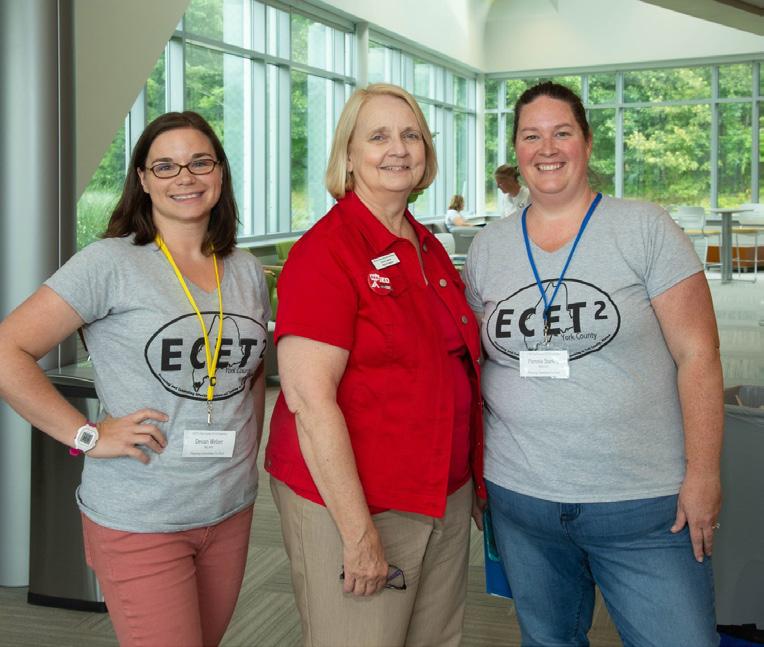
“If you could only sense how important you are to the lives of those you meet; how important you can be to the people you may never even dream of. There is something of yourself that you leave at every meeting with another person.”
-Fred Rogers
Profesora de español de secundaria de Greely en Cumberland. Enseñó durante más de 40 años, K-12 en Maine, Massachusetts y España. Certificado por la Junta Nacional.
High School Spanish Teacher from Greely in Cumberland. Taught for over 40 years, K-12 in Maine, Massachusetts, and Spain. Nationally Board Certified.

1985 Grace moved to Maine
1972
Taught first class in Madrid, Spain
1999-2006 Board member
Pre 2000
Local president of MSAD 51, RA delegate, committee member
2006-2012
NEA Director Committee member
2012-2018
MEA Vice-President MEABT Trustee
2018-Present
MEA President
Letters from the President written in the Maine Educator
Years on the MEA Board of Directors 6 Years as MEA President WATCH OUR APPRECIATION VIDEO TO GRACE

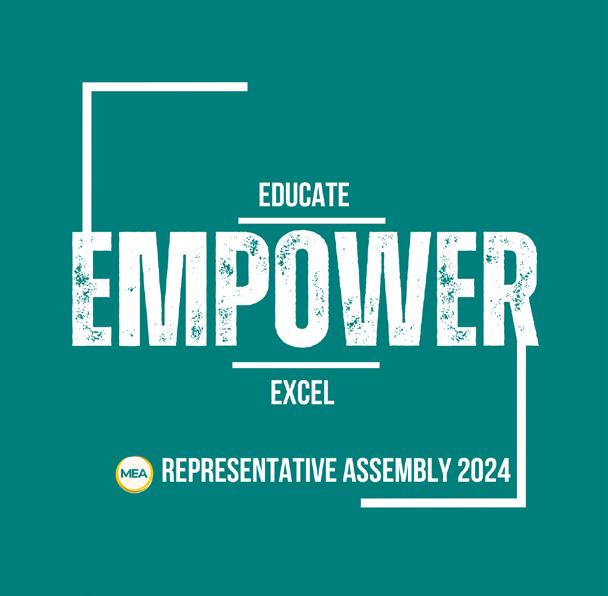
The MEA held its annual Representative Assembly (RA) in May. The MEA RA is the largest democratic body of the association, made up of educators elected by their local associations to represent their districts.
This year, RA delegates set the course of work for the Union in the upcoming school year and discussed and took positions on key education issues. The following pages are items voted on by the delegates at the Representative Assembly.

A member of the Maine Chapter of Moms Demand Action, Marissa was quick to join when MEA members formed the group Educators for Gun Safety. Marissa's dedication and tireless efforts have not only made our state a safer place, but they have also inspired others to take action.
Nathan, a member of Falmouth EA, is a perfect example of how strong organizing and leadership can create positive change in the community. Nathan’s success orchestrating two successful write-in campaigns for the Falmouth School Board is an example of the profound impact that political action has at a local level.

MEA’s Ashley Bryan Arts and Humanities Award honors an individual in the arts and the humanities for their commitment to education and their work and advocacy for human and civil rights and social justice.
The Director of the Greater Portland Immigrant Welcome Center, Reza Jalali, is credited with leading the organization to financial stability, increasing programming that improved the lives of New Mainers, and launching the “Women Lead” program which seeks to empower immigrant women to pursue their economic and educational goals.
Side X Side works "side by side" to create community partnerships between organizations like the University of Southern Maine, school districts, and artists to enhance the school curriculum through the arts.
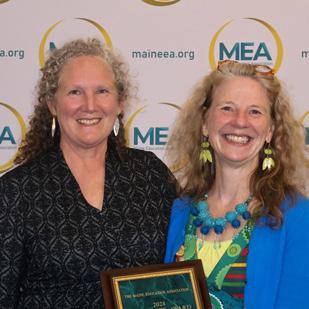
As the House Chair of the Education and Cultural Affairs Committee, Representative Brennan has consistently demonstrated his dedication to ensuring quality and equitable public education and his commitment to both educators and students.
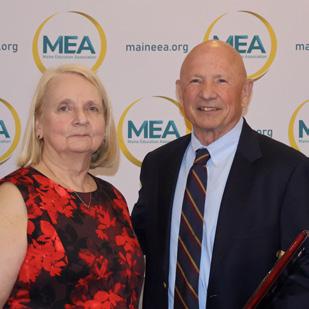

Stephanie has been an active volunteer in the Hermon Schools since her children were in kindergarten. More recently, she has volunteered for the Junior Achievement Program in third-grade classrooms and is the Key Club advisor for the high school. Currently, Stephanie serves as the chair of the Hermon School Committee, where she has proven herself to be a strong advocate for Hermon students and educators.
(Pictured above is Stephanie's daughter accepting the award on her behalf.)

Through its writing programs and workshops, The Telling Room empowers young writers aged 6-18. Through its work with educators, assistance with college admissions essays, and youth publication programs, The Telling Room amplifies youth voices, creating deeper community connections.

Kim's contributions over the years have played a pivotal role in the success of the Lewiston High School soccer team. He has served as a mentor, supporting countless students by navigating waivers, scheduling physicals, acquiring essential soccer gear, providing transportation to practices, and ensuring their eligibility to stay on the team and participate in extra-curricular activities.
Yarmouth Education Association found new ways to re-engage support staff, tripling their ESP membership count in the unit. As a result, recent negotiations have gone a long way in strengthening the association and teachers and ESPs working together.
The local advocates and leaders at Coastal EA demonstrated a unity that emphasized the importance and value of every individual working in our schools. As a result, the lowestpaid positions, food service workers, have seen substantial pay increases during the last negotiation.
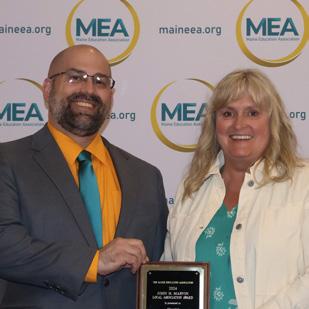
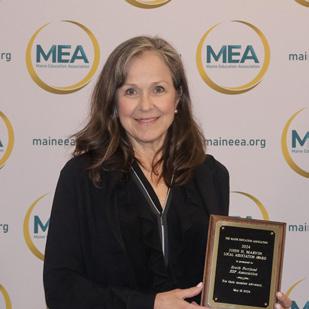
The South Portland ESP Association (SPESPA) successfully negotiated a pay raise and retroactive compensation for a member who served as transportation director without additional pay. Following extensive negotiations, SPESPA has established a new, permanent role in the Collective Bargaining Agreement that includes a salary commensurate with the added responsibilities.

Jennifer advocates for her students to be integrated into school day programming and provides direct support to students in the classroom. She successfully secured funding to create an outdoor play area for her students and advocated at the School Board to move the district's day treatment program into a school building. Her advocacy has improved outcomes for all students.
Jennifer is not only a strong advocate for her students and their families but also for her colleagues. As the ed tech president of the Portland Education Association, she tirelessly represents the membership and fights for her ESP colleagues. She has become a trusted advocate and a great representation of the impact that support professionals have on their students and schools.

Chris, President of the Damariscotta Area TA, has been pivotal in advocating for inclusive student safety policies. He rallied his association to support ALL students at a series of school board meetings on district policies regarding student safety and supporting transgender students. His leadership extends to chairing the MEA Government Relations Committee and influencing state policies through legislative testimonies. Chris's advocacy work truly reflects his commitment to public education.


The Clyde Russell Scholarship Fund was created by the MEA through a trust established by the late Audrey Lewis. It awards graduating seniors monies to help cover tuition, room, board, books, and fees.
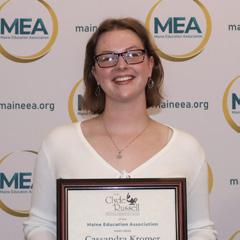


All applicable Articles, Sections and Parts of the Bylaws were amended by making the following changes throughout, where the change does not result in ambiguity: the words "he/she" will be deleted and replaced with the word "they", the words "his/her" will be deleted and replaced with the word "their", the words "him/ her" will be deleted and replaced with the word "them", and the words "his/hers" will be deleted and replaced with the word "theirs".
BYLAWS ARTICLE II, SECTION 2, PART
A
ARTICLE II. REPRESENTATIVE ASSEMBLY
Section 2. Terms of Delegates and Alternates
A. All terms of office of Representative Assembly delegates shall be for one year. The terms shall begin and expire upon ratification of MEA election results.
BYLAWS ARTICLE VI, SECTION 2, PART D:
ARTICLE VI. COMMITTEES
Section 2. Standing Committees
D. Statewide Bargaining and Organizing Committee
A Statewide Bargaining and Organizing Committee shall consist of one (1) member with bargaining expertise from each UniServ District, one (1) education support professional member selected from the state at-large, one (1) Maine Education Association retired member, and one (1) student member. Where representation from each UniServ District is not feasible, the President shall have the option of filling committee positions
with at-large appointments for not more than one (1) year. Committee members shall be appointed for three-year (3) terms.
BYLAWS ARTICLE X, SECTION 1: ARTICLE X. GENERAL PROVISIONS
Section 1. Indemnity
Each officer, member of the Board of Directors, and employee of the Association shall be indemnified by the Association against expenses, including attorney's fees, judgments, fines and amounts paid in settlement, actually and reasonably incurred by them in connection with any threatened, pending or completed action, suit or proceeding, whether civil, criminal, administrative or investigative (other than an action by or in the right of the Association), by the reason of the fact that they are or were an officer, member of the Board of Directors or employee of the Association, or is or was serving at the request of the Association as a director, officer or employee of another corporation, partnership, joint venture, trust or other enterprise, if they acted in good faith and in a manner they reasonably believed to be in the best interests of the Association and, with respect to any criminal action or proceeding, had no reasonable cause to believe that their conduct was unlawful. The termination of any action, suit or proceeding by judgment, order, settlement, conviction or upon a plea of nolo contendere, or its equivalent, shall not, in itself, create a presumption that
a person did not act in good faith and in a manner which they reasonably believed to be in the best interests of the Association, and with respect to any criminal action or proceeding, had reasonable cause to believe that their conduct was unlawful.
The Association shall have the power to purchase and maintain insurance on behalf of any person who is or was an officer, member of the Board of Directors or employee, or is or was serving at the request of the Association as an officer, director or employee of another corporation, partnership, joint venture, trust or other enterprise against any liability asserted against and incurred by the person in any such capacity, or arising out of their status as such, whether or not the Association has indemnified them hereunder.
Expenses incurred in defending a civil or criminal action suit or proceeding may be paid by the Association in advance of the final disposition of such action, suit or proceeding as authorized by the Board of Directors in the manner provided by the applicable statutes of the State of Maine concerning indemnification by nonprofit corporations currently contained in 13-B MRSA, Section 714, Sub-section 3, upon the receipt of an undertaking by or in behalf of the officer, member of the Board of Directors or employee, to repay such amount, unless it shall be ultimately determined that they are entitled to be indemnified as provided herein.
In the event that such action or proceeding be by or in the right of the Association, the Association shall have the same power to indemnify and insure any such officer, member of the Board of Directors or employee, except that no indemnification shall be made in respect of any claim, issue or matter as to which such person shall have been adjudged to be liable for negligence or misconduct in the performance of their duty, unless the court wherein the action or proceeding is tried shall specifically find that despite the adjudication of liability, but in view of all the circumstances of the case, such a person is fairly and reasonably entitled to indemnity.
The indemnification provided by these Bylaws shall not be deemed exclusive of any other rights to which those indemnified may be entitled under any statute or regulation of the State of Maine.
As used in this provision, the terms "officer" and "member of the Board of Directors" include the respective heirs, executors and administrators of persons holding such offices in the Association. The term "employee" means the following Association employees: the Executive Director, Deputy Executive Director and such other executive and supervisory employees as may be designated from time to time by the Board of Directors.
Constitution Changes
CONSTITUTION ARTICLE VI,
SECTION 3, PART A
ARTICLE VI. OFFICERS AND BOARD OF DIRECTORS
Section 3. Terms of Office
A. The Officers shall serve no more than two (2) three-year (3) terms to begin July 15. Officers shall not be eligible to consecutively succeed themselves more than once for the same position.
Officers who will have completed fewer than two (2) years of a vacated seat will be eligible to serve two (2) consecutive threeyear (3) terms.
Officers who will have completed two (2) years or more of a vacated seat are eligible to serve one (1) additional three-year (3) term.
New and Amended Resolutions Amendment to B11.
B11. RESOLVED: That the MEA believes every student has the right to receive an excellent education at a great public school. The MEA believes Great Public Schools have:
• safe, secure and supportive environments for all students and staff
• parent/guardian and community involvement and support
• educator involvement in educational policy
• fully qualified teachers and Education Support Professionals committed to students and their learning
• appropriate funding and resources, including technology
• appropriate technology and accessibility
• highly skilled and collaborative professional leadership
• challenging curricula that are flexible, innovative, diverse, and culturally and historically accurate
• well-maintained facilities with appropriate space and proper heating/cooling/ventilation systems.
(Adopted 1995; Amended 1997; Amended 2002; Amended 2012; Amended 2013; Amended 2015; Amended 2019; Amended 2021, Amended 2024)
New B38.
RESOLVED: The MEA believes that all Maine school districts should create and maintain positions whose express purpose is to improve relations among students, faculty, caregivers, and the community. (Adopted 2024)
New B39.
RESOLVED: The MEA believes that
all Maine schools should implement periodic equity audits and commit to responsive action toward the outcomes of those audits. Equity audits are systemic examinations of data across schools and a district to understand where gaps to access and challenges to education equity exist. (Adopted 2024)
RESOLVED: That the MEA supports pay equity for Education Support Professionals. That the MEA will pursue legislation for education support professionals to get paid at least 9% more than the highest of the City, State, or Federal minimum wage as base pay. (Adopted 1987; Amended 2002)
RESOLVED: That the MEA supports legislative action to increase retired educators’ pension exemption from $10,000 $35,000 to parity with the social security exemption and exclude any social security benefit received from being used to reduce the deduction. (Adopted 2012; Amended 2016)
New D34. REFERRED TO STATEWIDE BARGAINING COMMITTEE
RESOLVED: That the MEA will support public Adult Education as long as all educators are part of the local bargaining units.
Amendment to E22.
RESOLVED: That the MEA believes that public schools should have the necessary resources and properly trained staff in order to ensure all students receive culturally competent and traumainformed services. (Adopted 2010, Amended 2023, Amended 2024)
New E36.
RESOLVED: The MEA believes that in order for students to become informed citizens, to develop critical thinking skills, and to be prepared for the complex world in which we live, they need access to books and materials that include representation of all people and their identities, free from censorship. (Adopted 2024)
New E37.
RESOLVED: MEA believes that all students, inclusive of their identity, e.g.:
• race, religion, culture, language, ethnicity, national origin, ancestry, immigration status;
• age, health, disability;
• gender identity, gender expression, sexual orientation;
• residency status or location, socioeconomic status, and/or family makeup
must have equitable access to a quality, well-rounded public education.
We must ensure that all students are accepted, included, valued, respected, and supported. The diverse needs of all students—academic, social, cultural, emotional, and physical—must be acknowledged, and resources and services must be provided that enable each student to be successful in their educational journey. All students must have access to a safe, caring, compassionate, well-resourced learning environment that prioritizes their well-being and their education, and that inspires a lifelong love of learning. (Adopted 2024)
New E38.
RESOLVED: MEA believes that every child, student and educator deserves to live with peace, dignity and human rights and that all children, students and educators have the right to equitable and safe educational services, free from mental and physical harm. (Adopted 2024)
New E39.
RESOLVED: MEA believes that all children, students and educators are protected from attacks as civilians under International Humanitarian Law as specified by the Geneva Convention and that all children, students and educators have the right to access humanitarian aid (medical care, food, clean water, sanitation, and housing.) (Adopted 2024)
New E40.
RESOLVED: MEA believes that United States tax dollars should not be utilized to support actions that violate International Humanitarian Law as specified by the Geneva Convention. (Adopted 2024)
1. RESOLVED: The MEA will develop a working definition of an Equity Lens and provide training on how this can be facilitated by the monitors within the committees.
2. RESOLVED: The MEA will work to pass legislation that requires the state to compensate student teachers and their mentor teachers.
3. RESOLVED: The MEA Board will investigate ways to allow some committees to choose their own meeting dates so meeting dates can best be aligned with their charge and responsibilities.
RESOLVED: The MEA will promote the inclusion of job descriptions that are subject to negotiations in contracts.
5.
RESOLVED: The MEA will create an organizing strategy to promote and implement the goals of the statewide bargaining committee.
6. RESOLVED: The MEA will investigate providing training for committee members to successfully fulfill their responsibilities.
7. RESOLVED: The MEA will lobby for a decrease in the retirement age for public school employees from 65 to 59.5, accompanied by the elimination of early withdrawal penalties for retirement savings.
8. RESOLVED: The MEA will urge trustees of the Maine Public Employees Retirement System to develop a costeffective and financially sound investment portfolio that does not contribute to any corporation, state-owned entity, or financial product identified as being complicit in the violation of the human rights guaranteed to Palestinian civilians under international law.
RESOLVED: The MEA will work to pass legislation that requires the state to compensate any prospective educator
completing required full day field experience.
10. RESOLVED: That the MEA will facilitate a process by which members may contact MEA Board of Directors.
11. RESOLVED: That the MEA contact NEA affiliates who have achieved meaningful membership growth to obtain information & data on how those gains were achieved. The results of those inquiries will be published electronically to the RA delegates.
12. REFERRED TO GOVERNMENT RELATIONS COMMITTEE
RESOLVED: That the MEA supports districts to adopt BeSmart gun safety framework and the education of safe storage for firearms.
13. RESOLVED: That MEA will offer trainings on creating inclusive spaces for staff & students of all identities stated in resolution E37.
14. REFERRED TO EDUCATION SUPPORT PROFESSIONALS COMMITTEE
RESOLVED: The MEA will support and promote the NEA ESP Bill of Rights.
All applicable Articles, Sections and Parts of the Standing Rules were amended by making the following changes throughout, where the change does not result in ambiguity: the words "he/ she" will be deleted and replaced with the word "they", the words "his/her" will be deleted and replaced with the word "their", the words "him/her" will be deleted and replaced with the word "them", and the words "himself/herself" will be deleted and replaced with the word "themselves".
A
STANDING RULE 6: IMPLEMENTING CENSURE, SUSPENSION, EXPULSION
Section 6. Appeal to the Board of Directors
A. If the Judicial Board votes to censure, suspend, or expel the charged member, the charged member may, within fortyfive (45) days after the decision of the Judicial Board has been sent to them,
file a notice of appeal with the Board of Directors, together with any written arguments that the member may desire to submit. The charging party may file a written response within thirty (30) days of receipt of the notice of appeal and arguments submitted by the charged member. The charged member may file a reply within ten (10) days of receipt of any response by the charging party. At the same time that they file any material with the Board of Directors, including but not limited to a notice of appeal, the charged member and the charging party shall send a copy of all such material to the other party by certified mail, return receipt requested.

Samantha Burdick
This spring has been one of many firsts for me. I experienced my first Representative Assembly (it was wonderful to meet some of you there!), I went to Washington, D.C., to visit the NEA headquarters for the first time, I experienced my first Total Solar Eclipse, and I saw the Northern Lights for the first time, the last of which was the most unexpected of all!
When I first learned of the eclipse, I wondered if it was worth the hype, but now, April 8, 2024 will be engrained in my memory as a day that people across the state came together, paused, and looked toward something spectacular. I was lucky enough to view Totality from Stratton. It was breathtaking, remarkable, and worth every bit of hype. But I will cherish the memories that my partner Tom and I made with my childhood friend Kate and her family even more. As I scrolled social media that evening, seeing photos from friends across the state, I realized that for three minutes, we all took time to pause and genuinely live in the moment together.
And just a few weeks later, that same opportunity arose again, albeit more unexpectedly, when a strong solar storm made the Northern Lights visible across the state. I have always wanted to see the Northern Lights, but unfortunately, I've never had the chance to be in the right place at the right time until the evening of May 10,2024. Luckily, a friend gave me a heads-up. I jumped in my car and drove out of town, where I sat on a dirt road looking at the ever-changing colors in the sky, once again blown away by the beauty surrounding me. Once again, my social media feed was filled with pictures and memories of that spectacular Friday night that friends across the country shared.
This spring will always remind me of when we, as Mainers, collectively took the time to pause, look up, and marvel in the
beauty surrounding us. In a time when so many things divide us, there are also so many opportunities to come together as one large community.
This is the beauty of our Union. While we might teach in different communities and face different challenges throughout the year, when we come together as one, we learn that the challenges we face are not that different, and our collective voice is powerful.
I hope you have time this summer to pause, live in the moment, look up at the sky, and make memories with those around you.
Thank you for all that you do!
Sam













